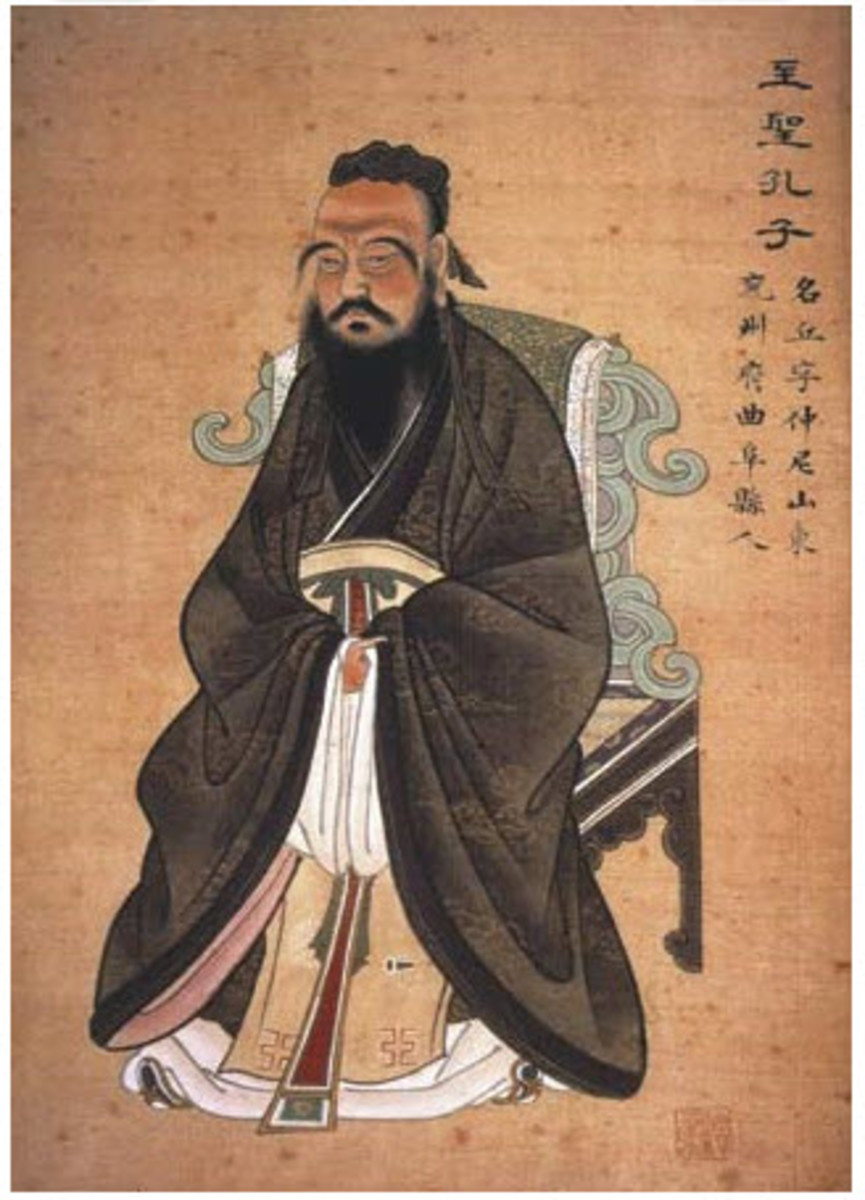The Influence of Confucianism in East Asia's Governance System
It is interesting that in East Asia, bureaucracy in the government system has a moral justification. In this region, bureaucracy is morally justified based on Confucius work and the work of his followers. Many nations in East Asia harbour a unique bureaucratic culture that can be traced back to Confucian ideology. Some of the main features of the Confucian ideology include the rule of law versus the rule of man, unique features in public officials, the nature of moral practices and conventions in governance, merit for public and governance officials, the significance of education and the logic of civil reciprocity. Other elements of Confucianism include how good officials should deal with those in power.
In essence, the theory of Confucianism has its roots in Vietnam, Japan, Korea and China. The theory has influenced many aspects of politics, social aspects, institutions, individual and group thought, moral teaching and cultural practices. Other areas where Confucianism has had an influence include historical interpretations, education philosophy, ritual exchanges, social relationships and moral teachings. Despite the striking inroads in westernization and modernization, the values of Confucianism have continued to have a significant part in the lives of many citizens in East Asia even in the current perspectives. Though this paper is focused on the potential impact of Confucianism on environmental thought and ethics, we can also not ignore the apparent gap between the practices and theories alongside the limitations of Confucianism. Nonetheless, the Confucian convention is still relevant today, where it has continued to exert much influence on the East Asian societies in their endeavor to obtain not only environmental integrity, but also sustainable development.
Discussion
Confucianism tradition has a magnificent cultural peculiarities, historical variations and national differences. Nonetheless, there are particular common values and ideas, which are spread across the region. These values constitute the basic tenets of Confucianism, which have endured over the years despite historical changes, as well as the changing political contexts. These include but not limited to a cosmological context that is dynamic, or worldview that is geared towards promoting harmony in the middle of change.
The other tenets of Confucianism include the embeddedness of each individual in ethical responsibilities and concentric circles of relationships. There is also the significance of the family including the present, past and future generations. Further, there is the role of a hierarchical system of society where loyalties to teachers and elders are considered paramount. Under this system, the aspect of education is given key significance since it is a key element in cultivating an individual, a key contributor to political stability, as well as enriching the society, role of the government in creating political bureaucracy for providing governance to a large number of citizens. History and its features are given critical significance in this theory since it is used for moral rectification and as a critical element in the continuity of civilization.
Apparently, Confucianism has influenced the thoughts of many scholars in East Asia greatly since its arrival. This is evident in works written by Kami priests and nobles from medieval times. There are two major scriptures, which were produced by Confucianism and Buddhism into Japan, the Nihongi and the Kojiki. The native Japanese produced them as they tried to preserve their primitive religion following the introduction of Buddhism and Confucianism.
Apparently, the philosophical impact of Confucianism has manifested themselves in different ways in modern perspectives of East Asia. This influence can be seen in day-to-day life aspects, as well as in organizational contexts in form of employee motivation, performance appraisal, teamwork, equal employment and pay, leadership, strategy formulation among other areas. It should also be considered that many of the Japanese industries have been able to succeed owing to the ethics and discipline of the people with beliefs of Confucianism, Shinto and Buddhism. This phenomenon tends to stress on self-cultivation and reciprocity, and this is why it was able to sustain itself and become widely accepted in this society for long.
The worldview of Confucianism has given it a unique significance in the society since it enhances harmony in the middle of change or political chaos. The theory provides us with a valuable perspective in which we can see nature as an element that is intrinsically valuable and comprehension of the function of human relative to the natural processes as a critical factor. In essence, Confucianism is featured by four main elements, the perspective of anthropocosmic instead of anthropocentric, comprehensive ethics that embraces nature and humans, an organic holism in the consistency of being and finally dynamic vitalism of the material force.
“Anthropocosmic”
“Anthropocosmic” is a term used in reference to a triad which is perceived to be a great heaven and which is considered a guiding force, humans and earth. This aspect is a key element in a Confucian theory from its expression in conventional texts to later and current developments. The seamless interaction between the three aspects sharply contrasts with the western traditions that have human-centred orientations where an individual in relation to divine figure is given much significance. In another perspective, the phrase Anthropocosmic represents a deep, prehistoric affinity of the universe and humans.
The term essentially serves as ecumenism in recalling the structural foundation of different faiths in their specific teachings and imageries from a particular source. The concept provides a common ground of wisdom where truth resides in relation to the contingent, diverse and natural existence that is graced by unitary, consistent and creative principle. The seemingly enigmatic mystery in human life could be made more comprehensible by use of this feature. The key aspect in this concept is that it comes along with a gender and universal complementary code. Every domain in the microcosmic entity is a reflection of each other, as well as the supernal macrocosm. The human and the universe are the equated with children and parents.
“Organic Holism”
By “organic holism” the world and universe in general is viewed as interpenetrating, interconnected and unified. All things get interrelated and affect other things whereby; the notion of macrocosm and microcosm are so critical to East Asian cosmology. More explanations on the interconnectedness of reality could be viewed in relation with five elements with directions, season, virtues and even colors. This type of categorization has its roots in the third millennium BCR, and resulted into emergency of such texts as I Ching (Book of Changes). The aspect of holism is featured by the view that there is no god creator behind the universe. Further, this sense has little concern with theories relating to the origin of the universe or a personalized god in relation to the continuous reality of an interconnected and self-generating universe that has been explained by Weiming as a “continuity of being. By definition, organic holism is a theory which relies on the concept that whole entities is a critical element in reality consists of an existence that is other than the mere sum of its or their parts. In another perspective, holism relates to a doctrine which explains that systems could have properties that are over and above its parts or the organization.
“Dynamic vitalism”
“Dynamic vitalism” relates to the core unit of the reality, which is made up of ch’i, a key material force in the universe. This factor is the basic element that unifies the cosmos and creates a foundation for profound reciprocity between the natural world and humans. The material force, which is referred as Ch’i is basically a substance in life, which forms the basis for the process of continuity and transformation that occur in the universe. The phrase sheng-sheng, which means “reproduction” and “production”, is consistently utilized in Confucianism texts in illustrating the creativity of nature. The identification of the ceaseless movement in the cosmos emerges from the reflective meditation on the nature’s fecundity in regularly giving birth to new life. Additionally, it also incorporates a classy awareness that considers change as the foundation of interactions and continuation of the web in life systems including human, animal, vegetables, and minerals. Finally, it emphasizes on transformation as a clear expression of life’s creative processes by which humans could harmonize their own behaviors and actions. Essentially, human beings are requested to model themselves in a vitality that is ceaseless in a cosmic process.
Comprehensive Ethics in Confucianism
In its comprehensive form, Confucian ethics is based on a cosmological context of the whole triad of humans, earth and heaven. The triad is completed by human action, which is undertaken in relation to the natural world and its cosmic changes and seasonal patterns. In this perspective, human beings are considered as ethical-historical and biological beings that thrive in a world that has complex relationships and correspondences. Individual and land cultivation are viewed as analogous process, which require attention, constant vigilance and care. In this context, virtues are considered as seeds, which come about from moral practice and come to flower as time goes by. The ethical vivacity of a person is placed against the backdrop of the dynamic pattern of the nature of Ch’i.
The medical practices and martial arts in East Asia offer a reflection on this endeavour to cultivate and balance an individual’s ch’i as a way of keeping a person’s moral and physical health. For majority of Confucians, this does not only imply the reciprocity with the patterns of nature but also the conscientiousness of the health of nature. Therefore, it becomes important for the government to support agriculture sector through such aspects as irrigation system in order to create a sustainable society. Human culture and livelihood was viewed as consistent with nature as this passage that was written down by Han on Confucian points out: “Humans, earth and heaven are the foundation of all creatures. While heaven offers them at birth with a sense of brotherly and filial love, the earth provides nourishment in terms of food, and clothing. On the other hand, humans complete this cycle with music and other rites. The three triads function together as the feet and hands work to complete the body, and none of these could be dispensed” (Lecture, Nov 7 2014, Religious Activism).
With this wide cosmological pattern of Confucian concept an individual is viewed in association with others and not really isolated to himself, herself. This implies that there are grounds in Confucianism, which emphasizes on the common good that is so essential in development of environmental ethics. In contradictory, western traditions have a tendency of underscoring the significance of a person, highlighting his or her freedom and associated rights. The theory of Confucianism places much emphasis on the essentiality of collaboration in the sense that an individual’s concerns and needs are sublimated to achieve the common good. In light of these self-perpetuation and altruism for the purpose of achieving a common goal may not be mutually exclusive. Rather, rights and not responsibilities are reinforced. This type of communitarian value system could be critical in fostering sustainable communities.
With the emphasis on family continuity by Confucianism, there is a strong moral basis for the indebtedness of past generations, as well as individual responsibilities to descendants. Within this ethical framework, there is a possibility of evoking a sense of communal responsibility and self-restraint towards the wellbeing of the environment for the good of the present and future generation. Stated differently, the Confucian theory places much emphasis on family lineage and that it seeks to ensure that there is continuity from the ancestors to the heirs. This raises the concept in another moral perspective where the intergenerations are given obligations in maintaining a health a healthy environment. From this basis, it could therefore be argued that unrestrained consumption and unrestricted development ought to be curtailed.
It should also be considered that Confucianism has been expanded to place human beings in relation to the biological lineage of life in the natural contexts. In this perspective, loyalty to teachers, elders and those in authority have been widened to include respect for the complex ecosystem and life forms that have preceded humanity. This therefore gives an implication that biodiversity could be valued. The full dependence of humans on other forms of life for sustenance and survival could be underscored in this context. Therefore, the aspect of royalty has been broadened from the human world to incorporate the natural world.
Further, education of Confucian as basically a kind of moral cultivation has come to be seen as a way of contributing to the well being and stability of the sociopolitical order. In extension, moral restraint towards the unrestricted use of the environment could be viewed as adding to the political and social stability of the region in general. From the perspective of Confucianism, moral education and suasion are a true way of stirring communal changes that could enhance this kind of stability through voluntary measures and individual choice instead of using legislative means.
In most parts of East Asia, there are many business practices, which would not have objections by the westerners that are considered immoral. For instance, if a particular gas station charged high prices for gas simply because it was the only place where the gas was available, Asians would not take this lightly. Though it may not be a problem to do this in a market that is competitive, it is regarded as immoral in the minds of East Asians since the customer is taken advantage of, particularly considering that the customer has no alternative.
Conclusion
In conclusion, the concept of Confucianism has created a potential in enhanced appreciation of nature as a factor that is an intrinsically valuable. Further, has provided a basis for moral integrity, as well as personal vitality that is so critical in sustaining the environment and the life of the community. Furthermore, this concept emphasizes on nature as the basis of all that sustains life from the basics of clothing, food and shelter to countless sources of employment. We are not denying that the negative dimensions of Confucianism as a concept do exist, nor are we claiming that the theory of Confucianism has resulted in ecological fitness in East Asia. Nonetheless, we can give as suggestion that there are many ways where Confucianism has been helpful in the current context, particularly in East Asia. This reinterpretation from within this theory can both be based on the works and efforts of New Confucians and Tu Weiming. Many of the insights reflected in this paper are based on their works. Further, the scope of this revival has yet to be expressed in full scale in East Asia and beyond. Nonetheless, this theory is still considered relevant in influencing the environmental morality and ethic, not only in East Asia, but also in many parts of the globe.








